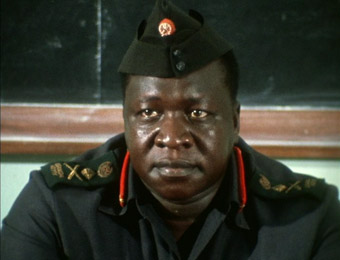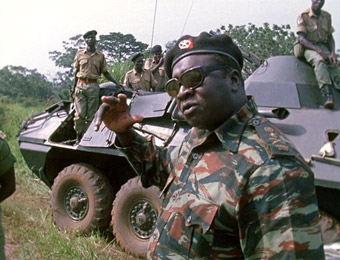|
I'm
old enough to remember General Idi Amin but was too young
to have had an informed opinion on him when he was in power.
I'll wager a large proportion of the generation that followed
hadn't even heard of him until his elevation to poster boy
though the release of Kevin Macdonald's excellent The
Last King of Scotland last year. In retrospect,
he seems like one of a stream of African and Middle Eastern
leaders that the West was instrumental in training and welcoming
to power, then later condemning when they saw what
they had helped to create.
Amin
very much fits this profile, joining the King's African
Rifles in the British Colonial Army in 1946 and later rising
to the rank of Commander in the Ugandan Army, then seizing
power from Prime Minister Milton Obote in a military coup
in 1971. It was a popular uprising both at home and abroad,
the British Foreign Office seemingly overjoyed with this
"splendid" fellow. But it didn't last long. The
persecution of ethnic groups and the expulsion of all Asians
in what Amin called an "economic war" quickly
soured international relations. Amin himself broke of diplomatic
ties with Britain in 1972 and the USA closed its Kampala
embassy the following year. Bodies of the disappeared began
to turn up in the Nile – a lot of them – and Amin's behaviour
became increasingly erratic. He even began awarding himself
non-existent honours (after Britain broke off diplomatic
relations in 1977, he made himself a CBE, a Conqueror of
the British Empire) and came close to declaring war on both
Kenya and Tanzania, the latter move backfiring and forcing
him, in 1979, to flee the country, never to return.

During
his time in power, reports in the western press too often
painted him more as an egotistical buffoon than a serious
threat to his own people, but then few seemed able to get
truly close to him for an extended period of time. One notable
exception was the director and former Cahiers du cinema
contributor Barbet Schroeder, who in 1974, with the full
co-operation of Amin at the height of his power, embarked
on a documentary portrait of the Ugandan president. The
resulting film, with the exception of a few telling scenes
that Amin ordered Schroeder to remove (more on this below),
actually serves to bolster this commonly perceived image, with Amin coming
across as energetic, good humoured, intermittently charming,
and just a little bonkers.
Initially Amin paints an engaging portrait of himself as
a man who has struggled up from the bottom and who is loved
and respected by his people for his honesty. "The reason
people like me," he tells Schroeder, "is that
I always tell the truth, and if I haven't anything good
to tell them I keep quiet." He takes Schroeder on a
river trip and talks warmly about the animals that live
there, and later even appears to be taking over the role
of director, enthusiastically encouraging cameraman Néstor
Almendros (the award winning cinematographer of L'Enfant
sauvage, L'Histoire d'Adèle H.,
Sophie's Choice and Days of Heaven)
to grab a shot of a passing helicopter. He jumps with tribesman
and plays accordion (very well) with a dance hall band,
he claims that the Ugandan political system is neither capitalist
nor communist but is made up from the best bits from both,
and his proclamation that women should be good homemakers
gives rise to the assertion that they would thus also make
excellent hotel managers, and orders are given that any
man who does not obey his new female boss is going to be
out of a job. Even his seemingly barmy idea of organising
food parcels for a then strike-beleaguered Britain comes
across as a witty prank, his apparent request to then prime
minister Ted Heath for a transport plane to ship them to
the UK going strangely unanswered.
But
elsewhere there are moments, however light-heartedly delivered,
that suggest Amin's darker side and his increasing megalomania. This is visible in his demands to his cabinet that they work harder
to teach the people to love their leader, in his proclamation
that he is able to dream the truth and that he knows the
exact time, date and method of his death, in his plans
for an international suicide squad to attack Israel, and in his
lack of sympathy for hijack victims because of the airline
they chose to fly with. Read between the lines and the signs
are also evident in the smaller details: the swimming race he takes part in that
no-one else dare win, the hastily withdrawn use of the word
'president' to refer to the head of the Uganda Medical Association
(under Amin's rule only he could be referred to by that
term), the nervous faces of those who dance to his accordion
playing, and the silent obedience of his cabinet ministers.

The
now restored cuts are sometimes more direct in their criticism
and were re-inserted into the film only after Amin's deposition
and exile. Amin's demand for their removal was initially
refused by Schroeder, but the director acquiesced when a
group of 150 French citizens living in Uganda were rounded
up, held in a hotel surrounded by soldiers and given Schroeder's
home phone number to plead for his compliance. The surprise
is that Amin objected to so little, presumably happy with
material that to an outsider may seem slyly critical, and
with statements of his own that seem to us either foolish
and/or alarming.
As
a documentary portrait in its own right, Idi Amin
Dada is an uneven and occasionally rambling affair –
a cabinet meeting is allowed to play out past when the point
of the scene has been made, and a particularly long interview
is broken up by sometimes decorative footage such as bats taking
flight, although maybe I'm missing some clever symbolism here.
There's little of the drama and tension of Nick Broomfield's
1991 portrait of South African neo-nazi Eugene Terre'Blanche, The Leader, The Driver and the Driver's Wife,
although Schroeder from the start stated that he never went
in looking to be critical, he just let Amin be himself and
do the job for him. As a stand-alone film it's certainly
intriguing and even entertaining, but with the UK DVD release co-inciding
with that of The Last King of Scotland
it takes on a very particular interest. If you were gripped
by Kevin Macdonald's film and particularly Forest Whittaker's
extraordinary performance as Amin, then General
Idi Amin Dada Autoportrait should prove fascinating
viewing and be considered must-see.
This
appears to be another of Masters of Cinema's licences from
Criterion, whose own DVD release dates back to 2002. Shot
on 16mm Ektachrome on the expected aspect ratio of 1.33:1,
the transfer is only a whisker short of excellent, with
colour, contrast and detail as good as you would hope for
such source material. Grain is visible but never distracting
and although there is some flickering of colour stability
on a couple of sequences, this is not particularly intrusive
and doesn't last long. The disc is, as with the MoC releases
of Salesman
and Grey Gardens,
in the NTSC video format. There is no regional coding.

The original mono soundtrack is clear enough, despite a
couple of reviews of the Criterion disc that suggest some
of the dialogue is lost to fluff and mumbling. Optional
English subtitles for the hard of hearing are available,
but I didn't find a reason to switch them on.
There are no extras on the DVD itself, but
as usual Masters of Cinema have supplied a very well produced
and informative Booklet, this one containing a 1976 interview
with Barbet Schroeder, Schroeder's own breakdown of the
cuts imposed by Amin and a 1975 article in which Dr. Tilo
Held psychoanalyses Amin, making specific references to
scenes in the film.
A structurally loose but still interesting portrait of a
charismatic despot who seemed blissfully unaware of how
his words would be interpreted by outsiders. The UK DVD
release is perfectly (and perhaps deliberately) timed to
pair it with Macdonald's widely heralded drama and they
make for fascinating companions. For once the Criiterion disc doesn't
have enough in the way of extras to really give it an edge,
so the Masters of Cinema DVD is, for UK viewers at least,
the logical way to go.
|